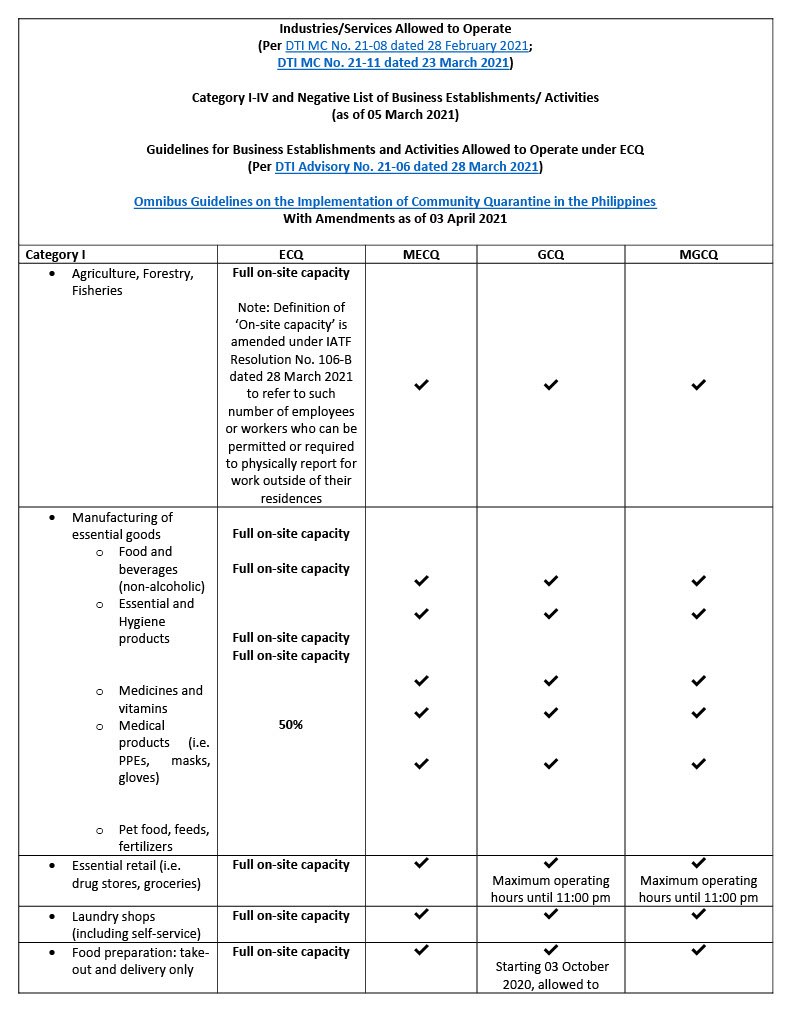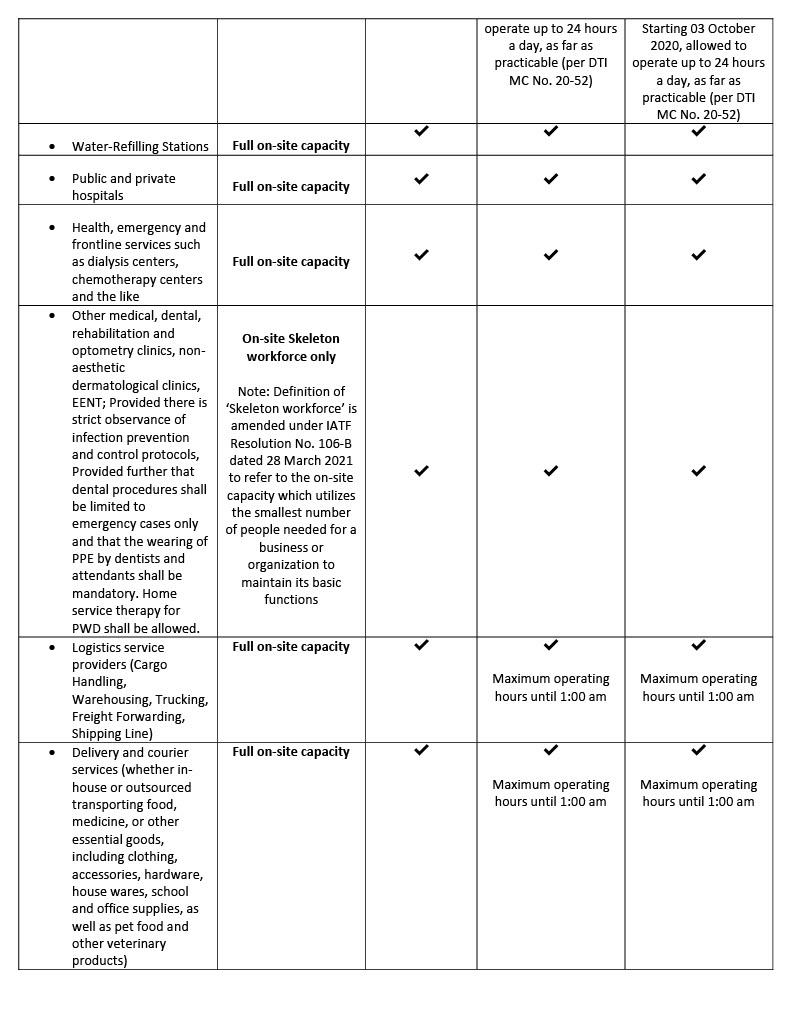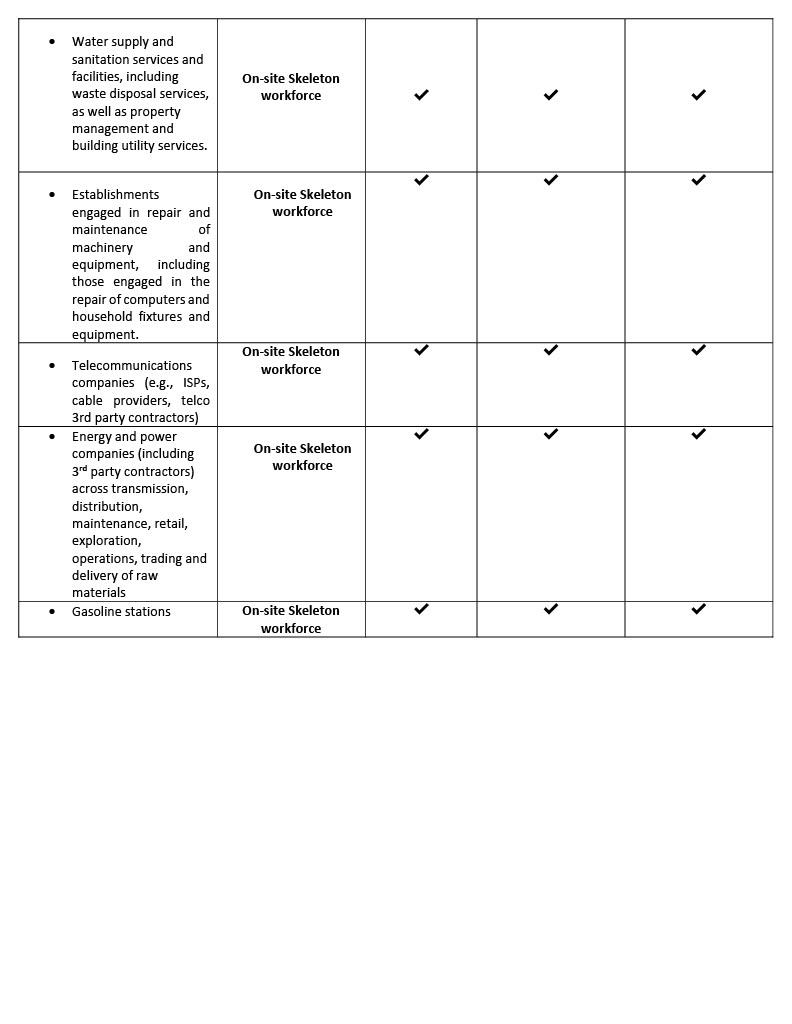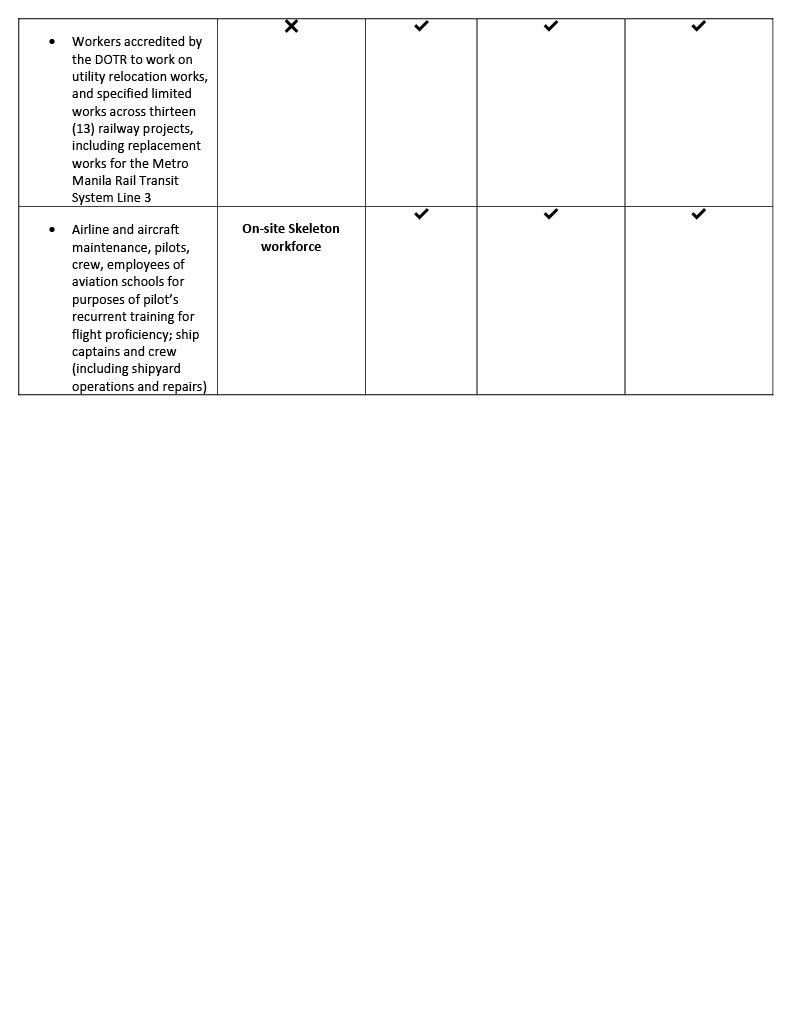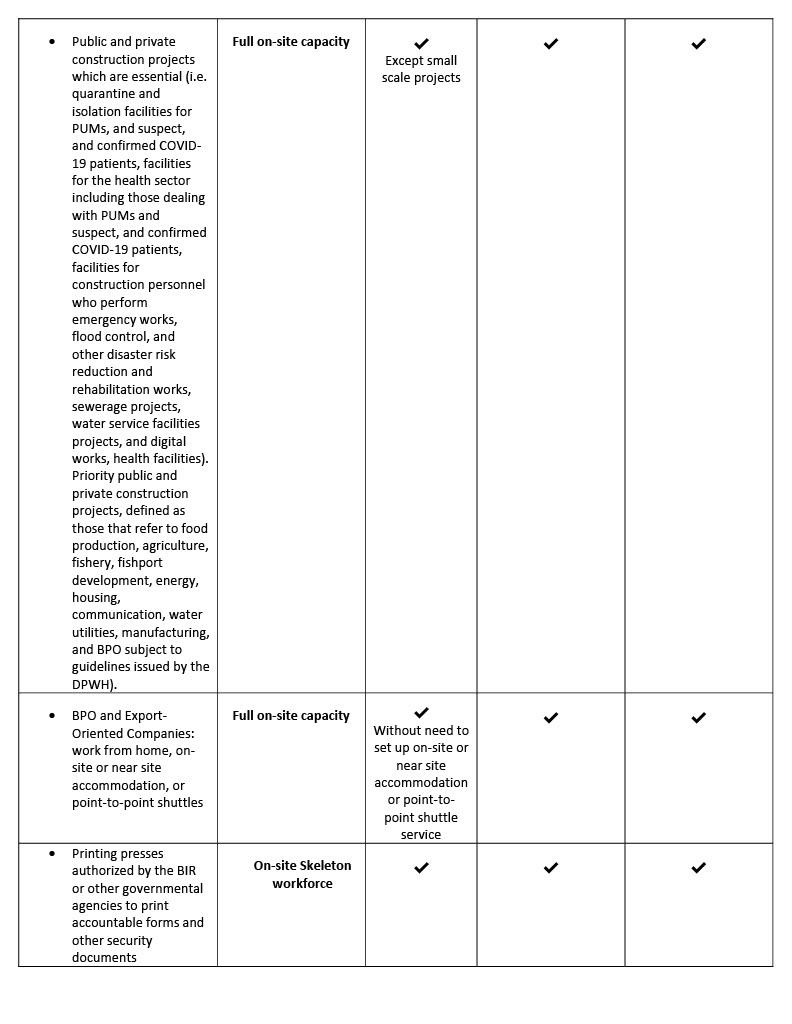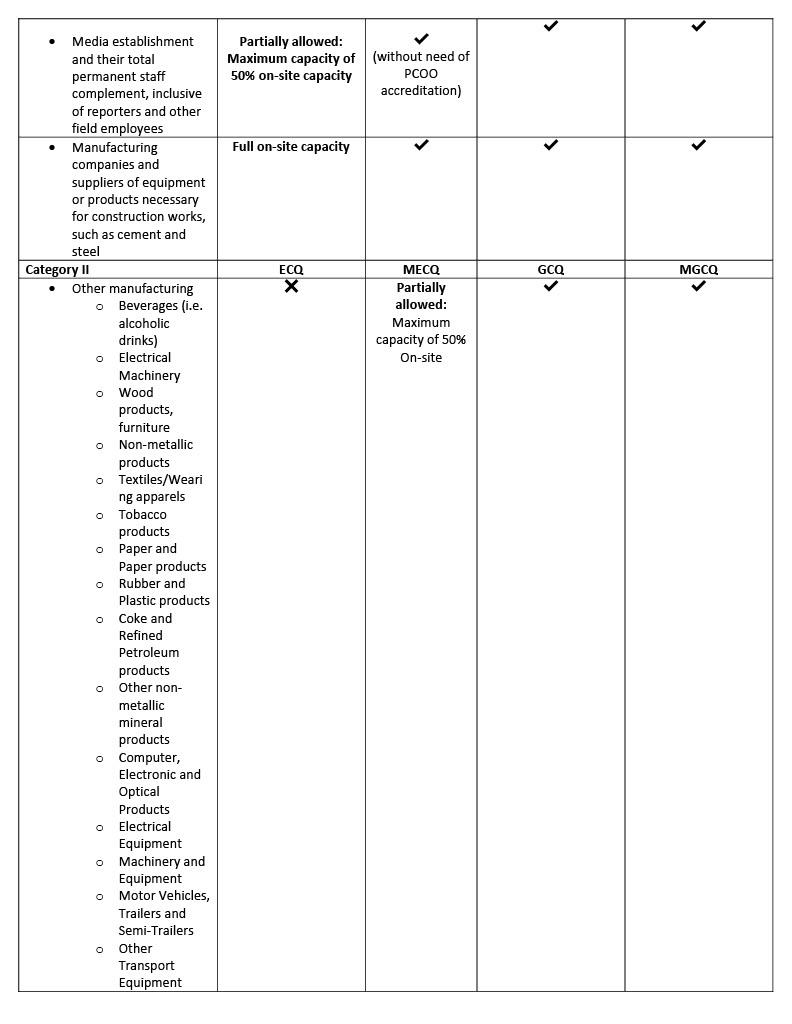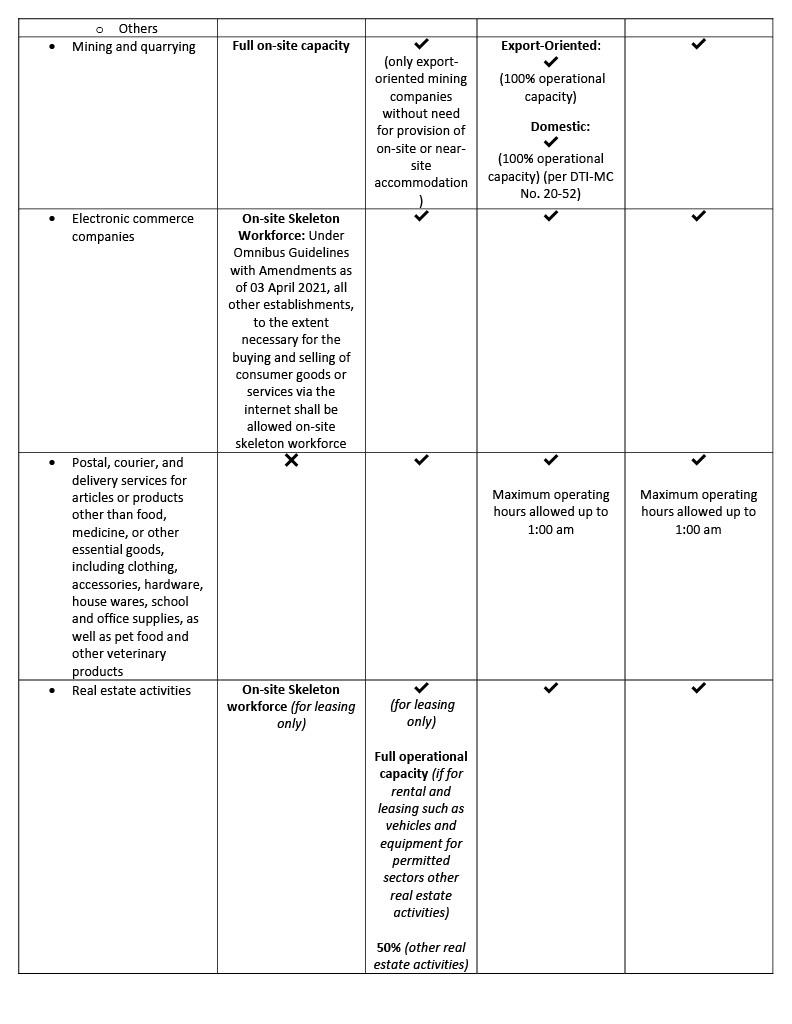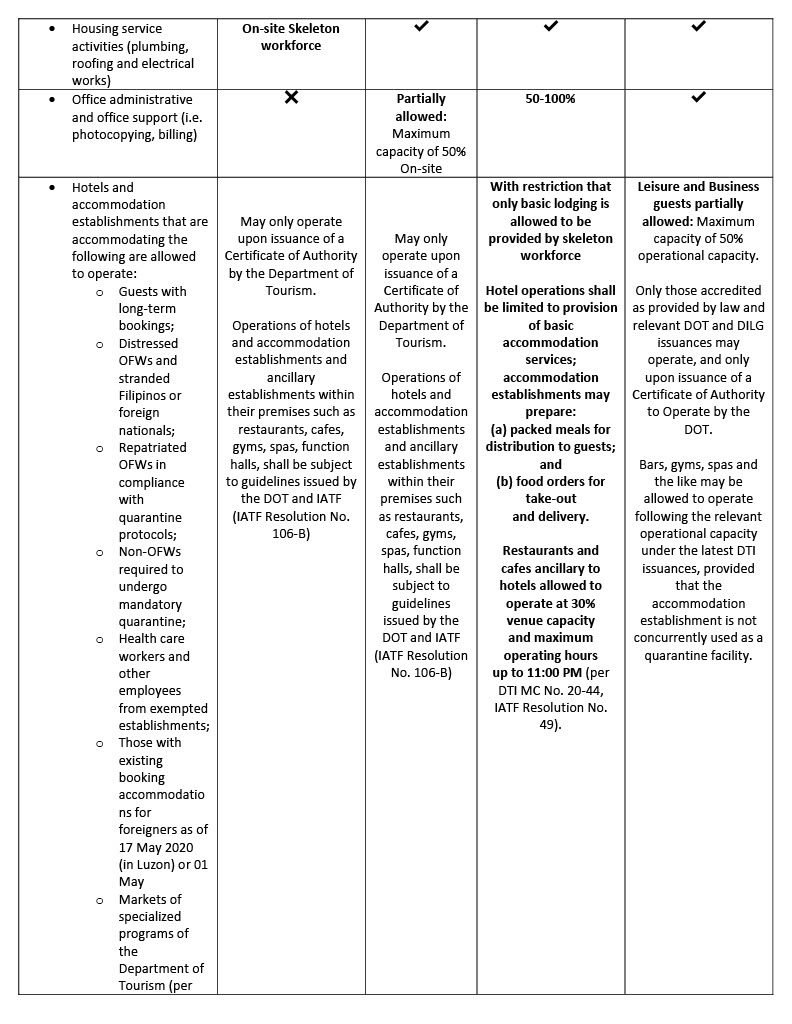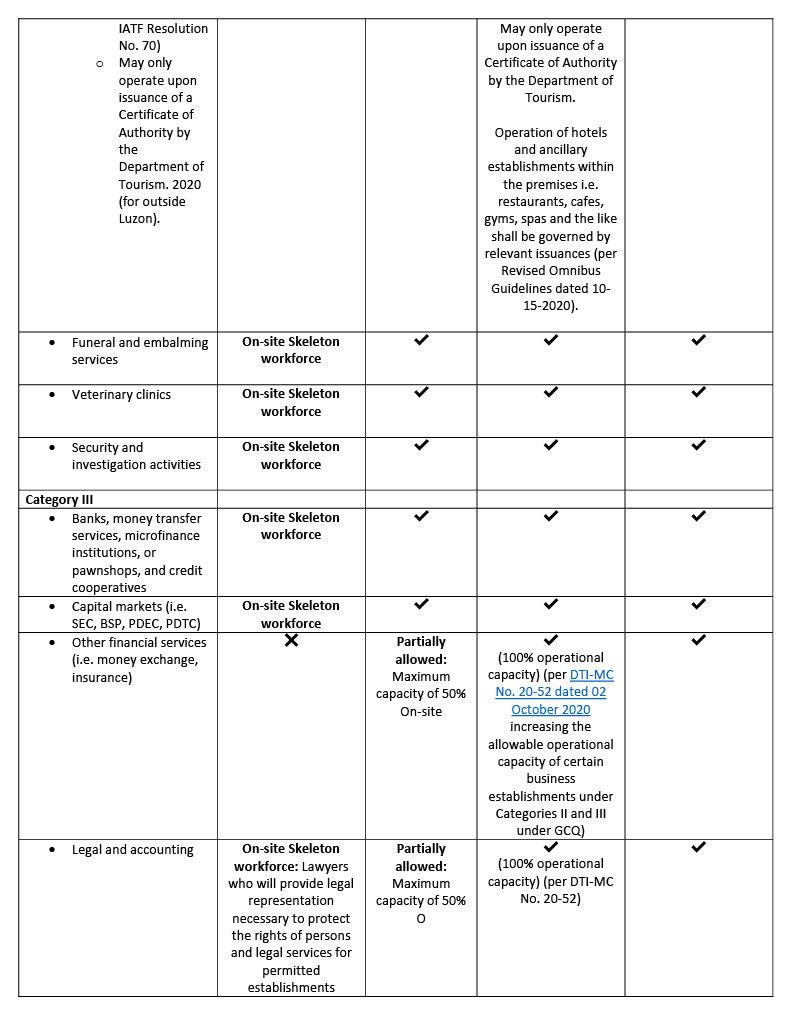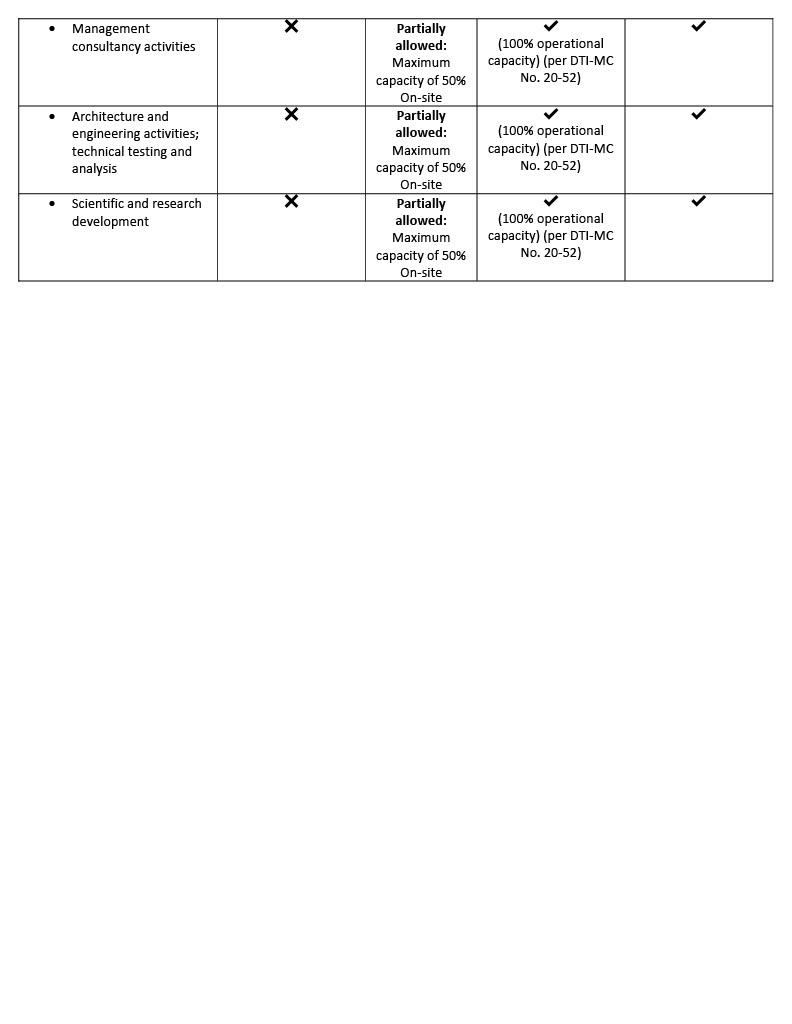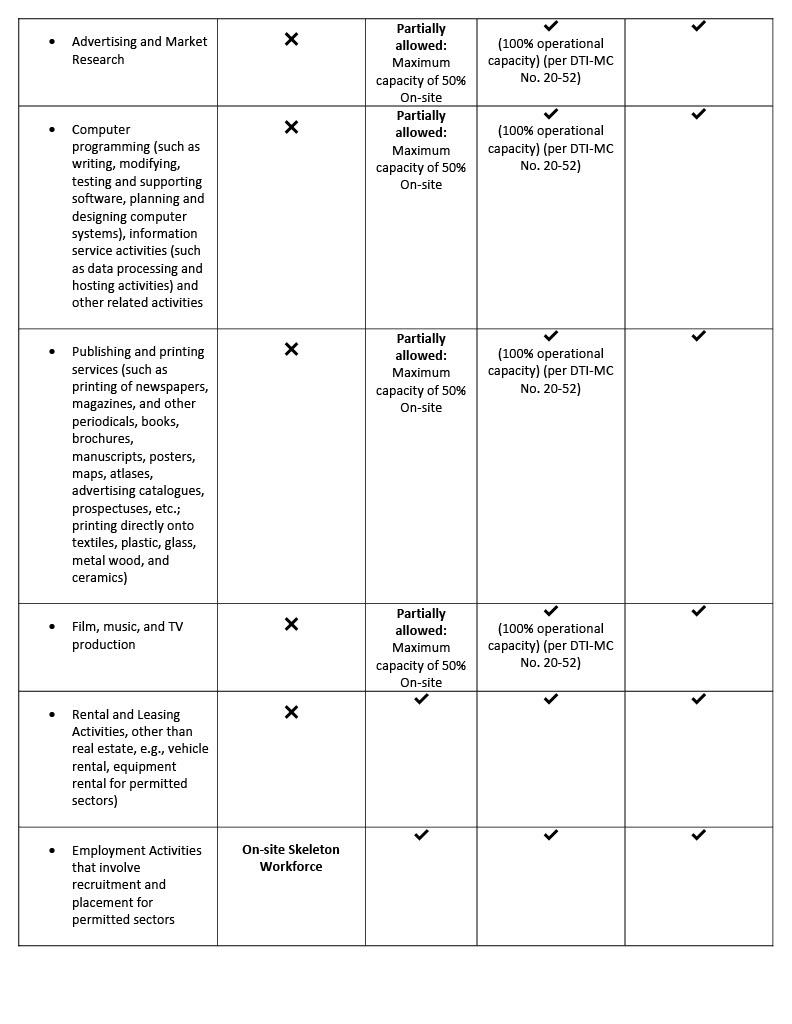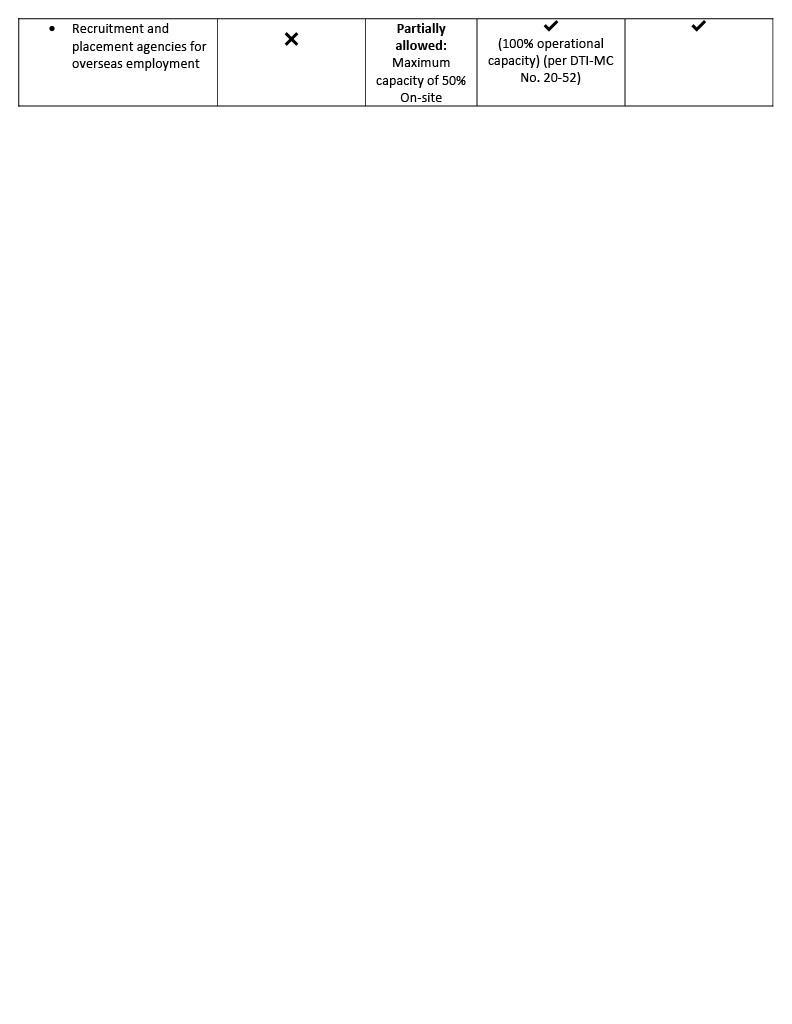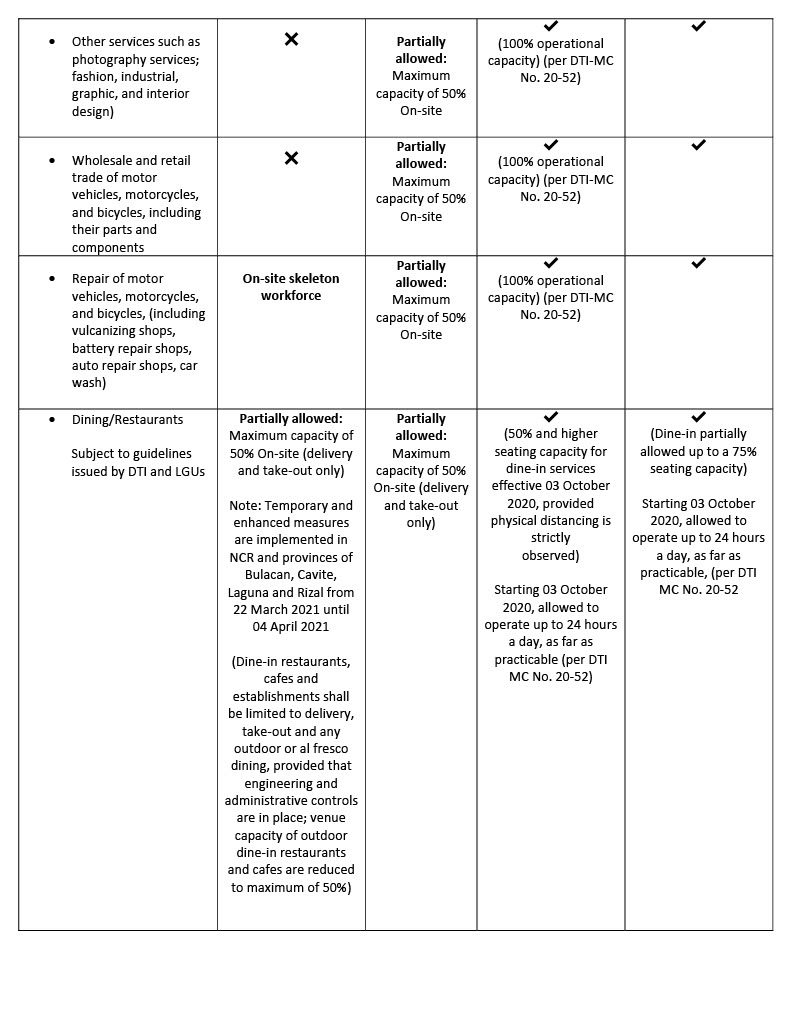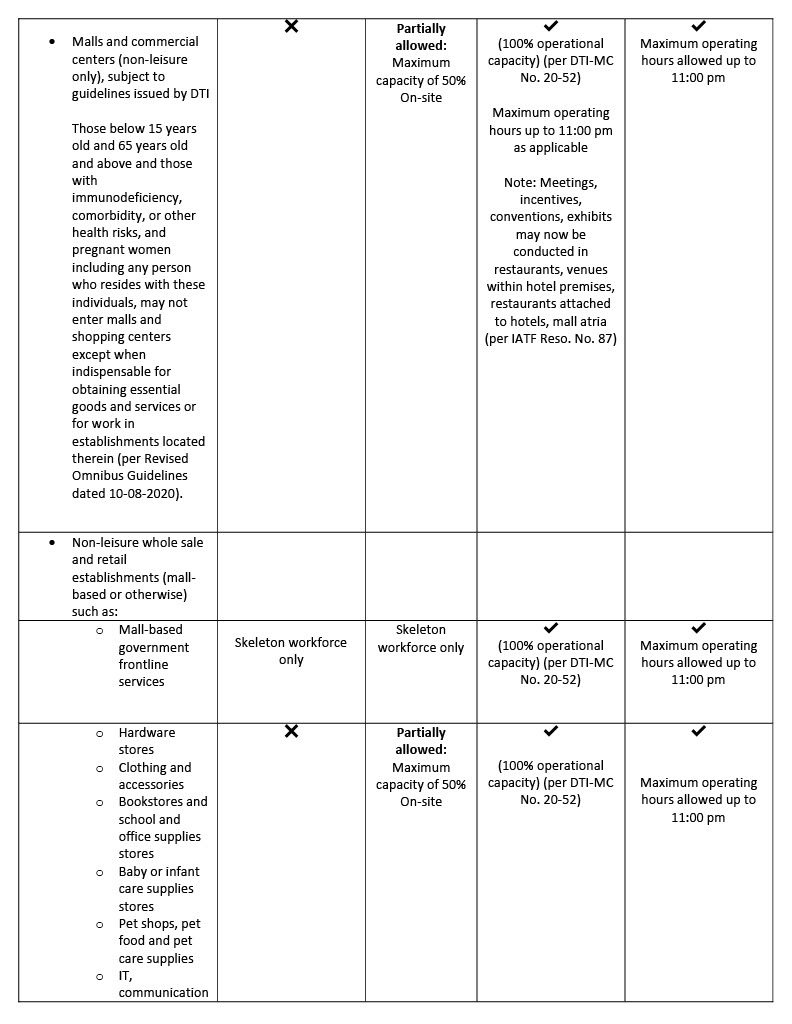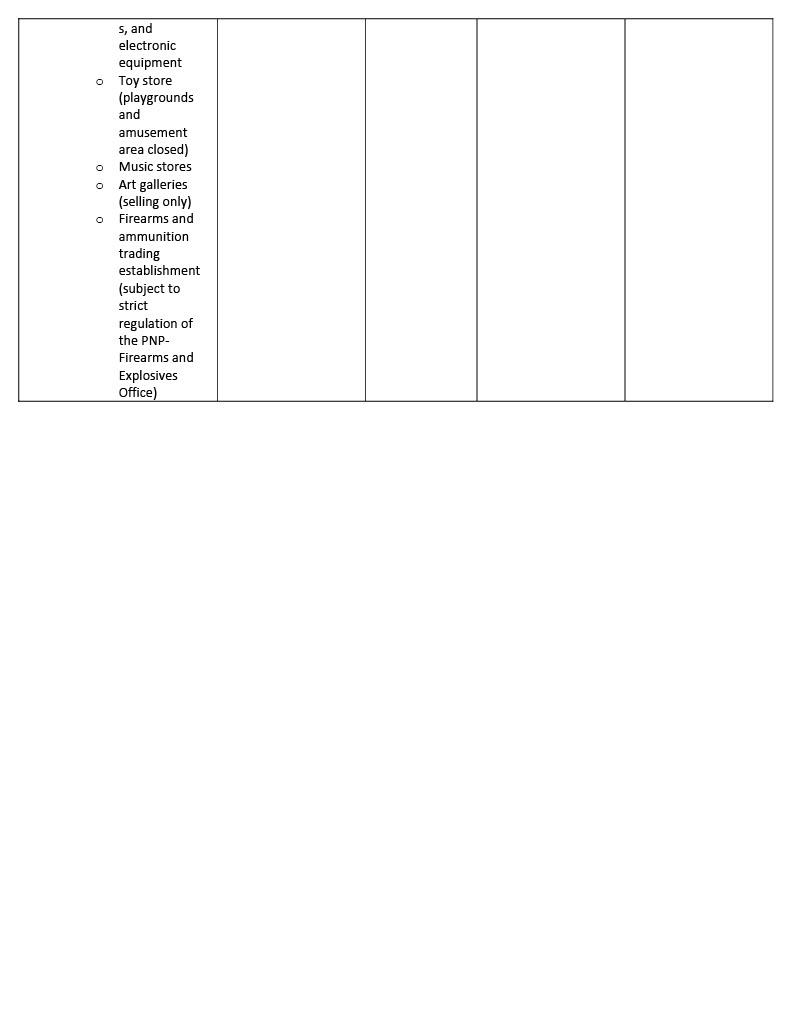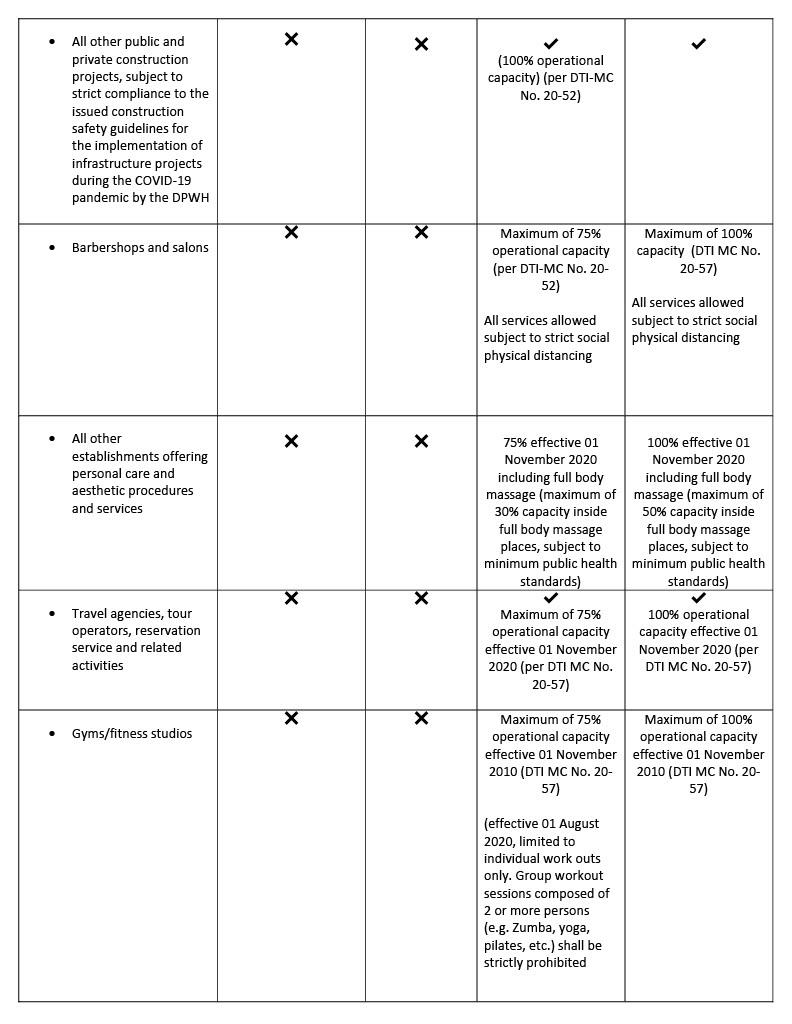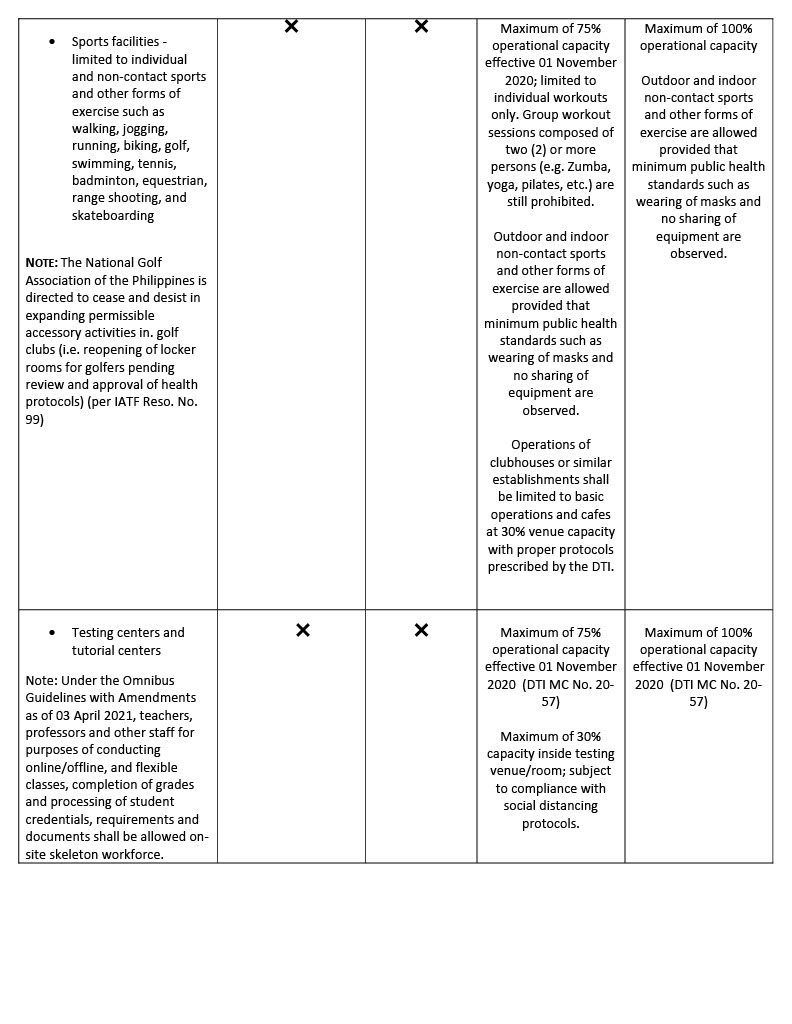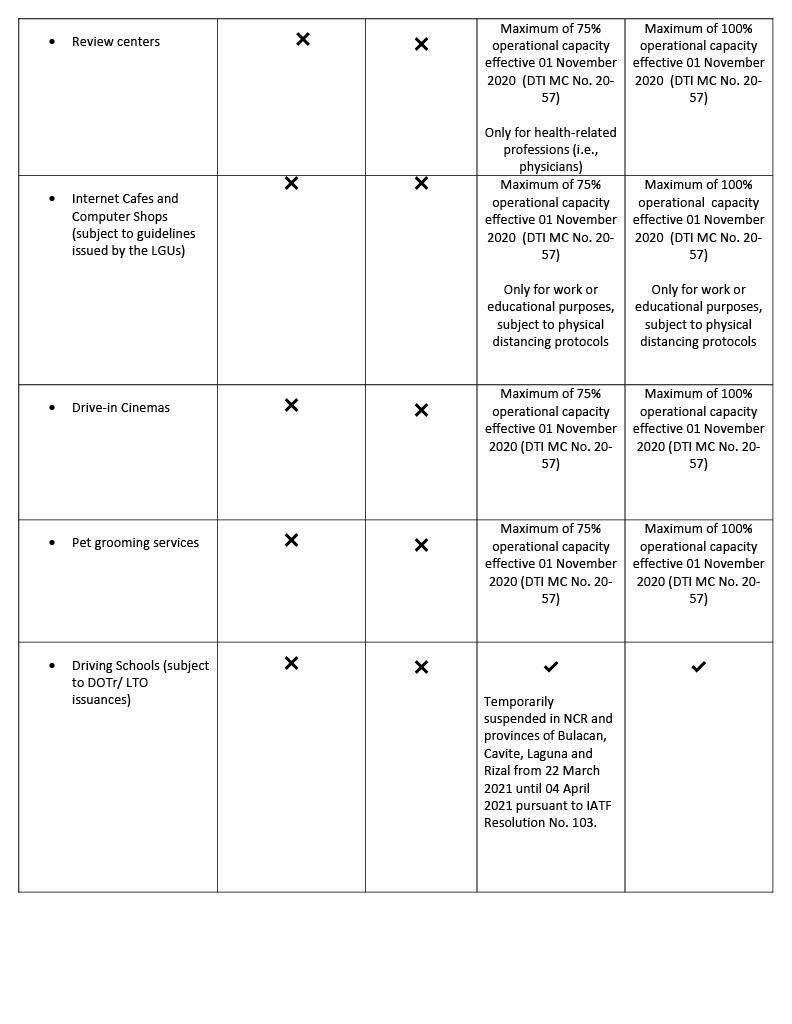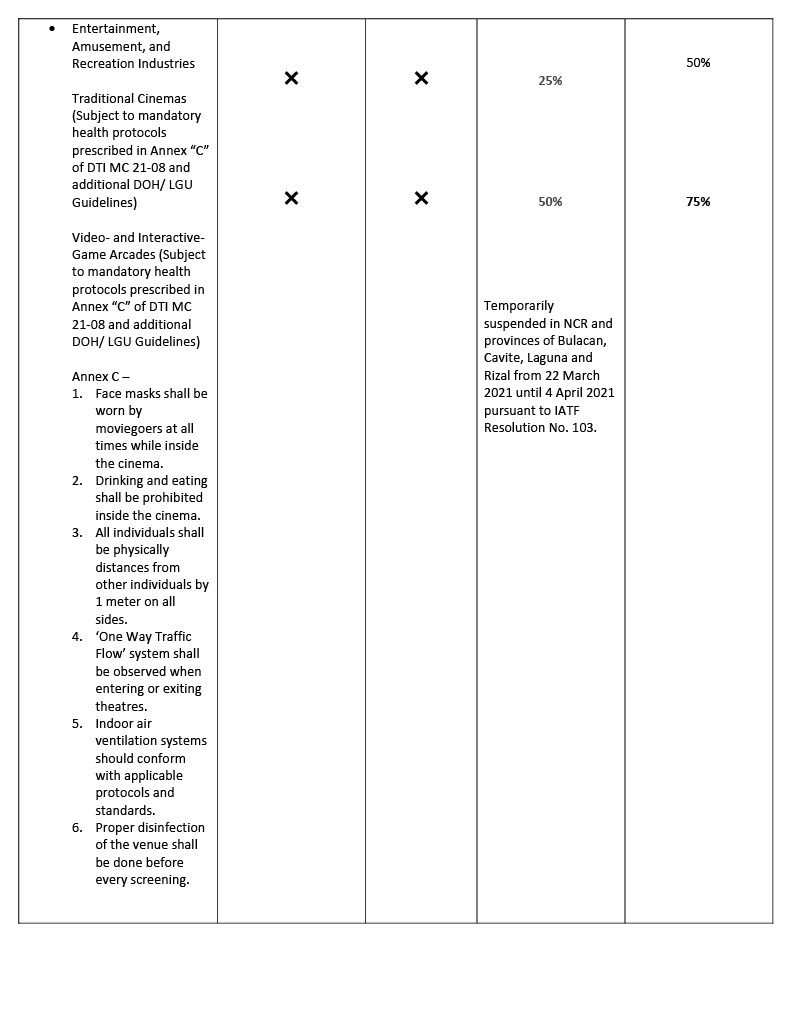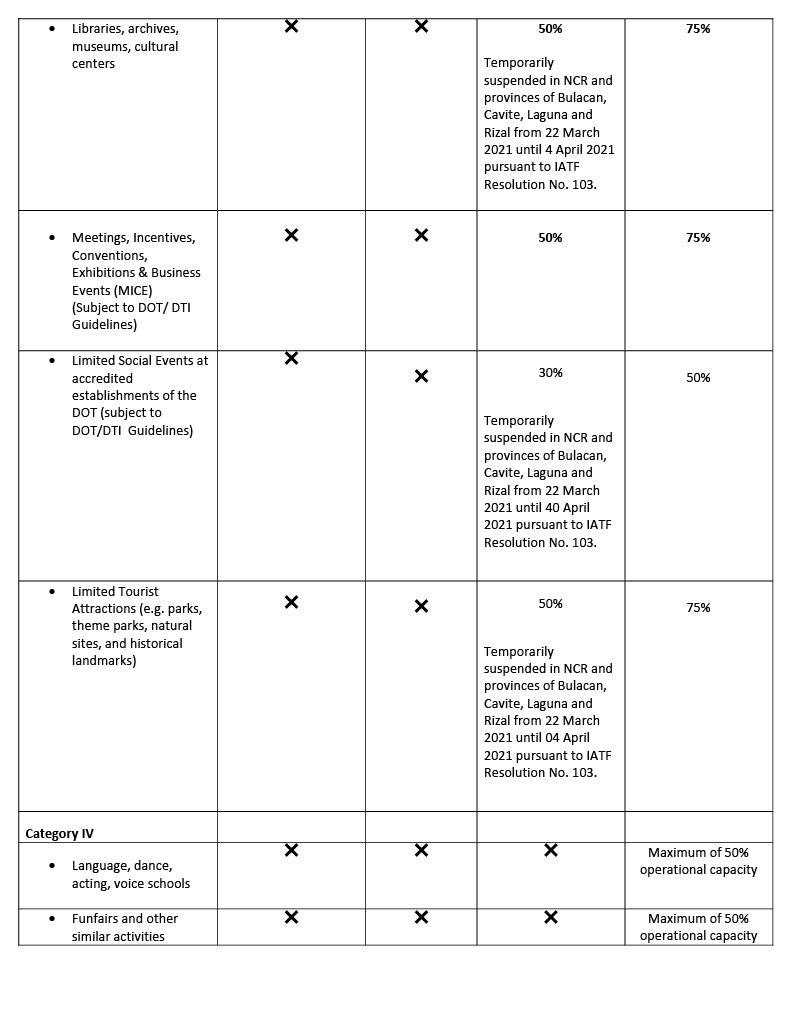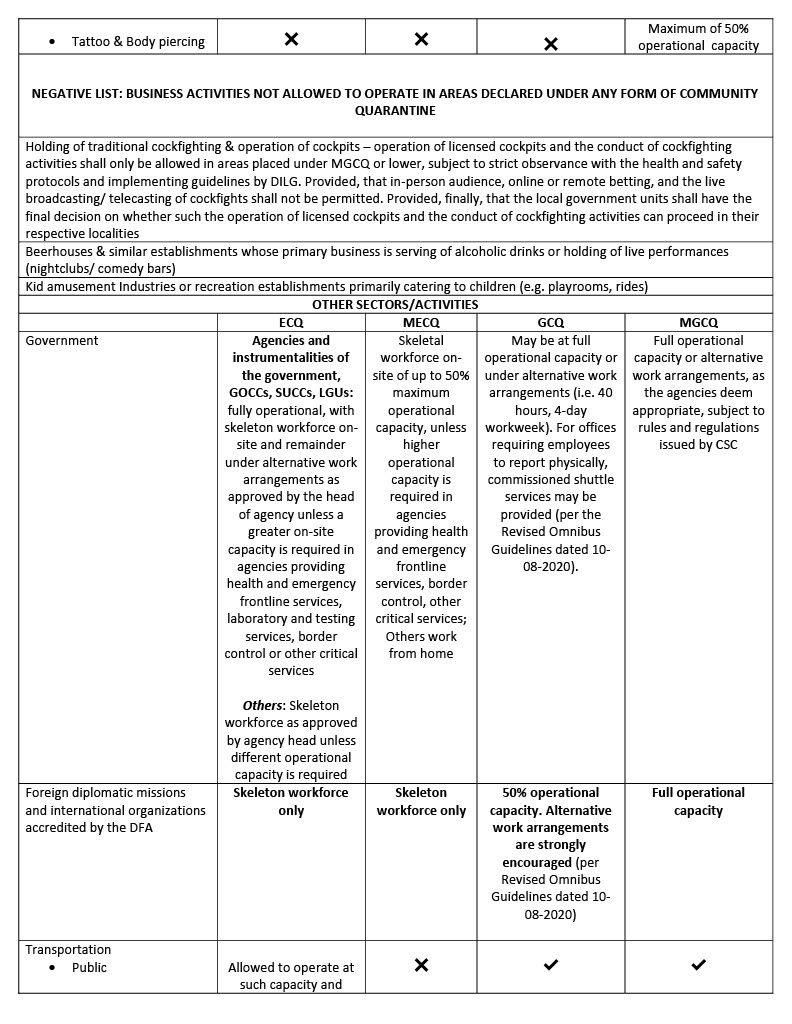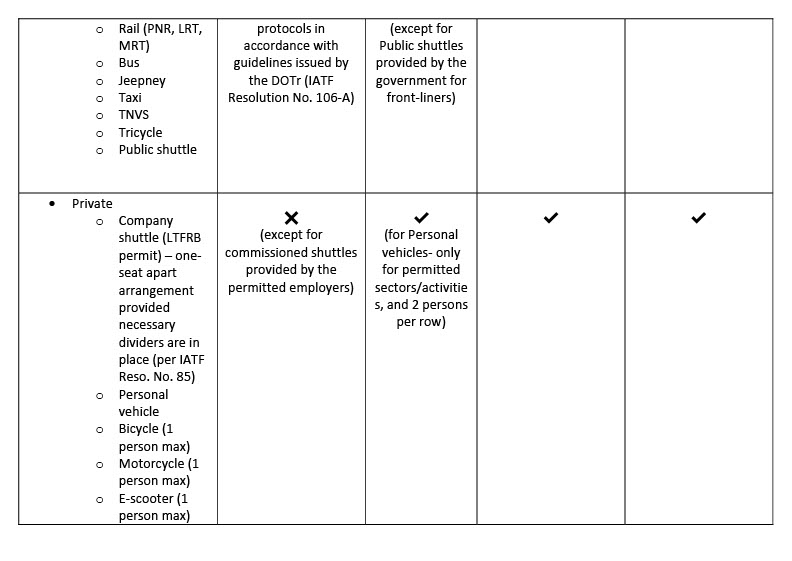Civil, Property, Family Laws
Business Operations Allowed Under ECQ, MECQ, GCQ, and MGCQ
Further Updated as of 06 April 2021
The Executive Secretary released the Memorandum dated 27 March 2021 approving the recommendation of the Inter-Agency Task Force to place the provinces of Bulacan, Cavite, Laguna and Rizal, and the highly urbanized cities of the National Capital Region and the municipality of Pateros under Enhanced Community Quarantine until 04 April 2021 in order to slow down the surge in COVID-19 cases. During the press briefing on 03 April 2021, the Palace spokesman Harry Roque announced the further extension of the ECQ in said areas until 11 April 2021.
Pursuant to IATF Resolution No. 107-A dated 29 March 2021, the following are the quarantine classifications for April 2021.
ECQ | MECQ | GCQ | MGCQ |
NCR Bulacan Cavite Laguna Rizal (March 29 – April 11, 2021) | Quirino Province (April 1 – 15) Santiago City (April 1 – 30) | Cordillera Administrative Region (CAR) – Abra, Apayao, Benguet, Baguio City, Ifugao, Kalinga, Mt. Province Region 1: Cagayan, Isabela, Nueva Vizcaya Region 4-A: Batangas Region 8: Tacloban City Region 10: Iligan City Region 11: Davao City BARMM: Lanao del Sur (April 1- 30, 2021) | Luzon: Region 1: Ilocos Norte*, Ilocos Sur, La Union, Pangasinan, Dagupan City* Region 2: Batanes Region 3: Aurora*, Bataan*, Bulacan, Nueva Ecija*, Pampanga*, Tarlac*, Zambales*, Angeles City*, Olongapo City* Region 4– A: Quezon*, Lucena City* Region 4-B: Marinduque, Occidental Mindoro*, Oriental Mindoro*, Romblon, Palawan, Puerto Princesa City* Region 5: Albay, Camarines Norte, Camarines Sur, Catanduanes, Masbate, Sorsogon, Naga City. Visayas: Region 6: Aklan, Antique, Bacolod*, Capiz, Guimaras, Iloilo*, Iloilo City*, Negros Occidental Region7: Bohol*, Cebu*, Negros Oriental, Siquijor, Cebu City*, Lapu-Lapu City*, Mandaue City* Region 8: Biliran, Eastern Samar, Leyte, Northern Samar, Western Samar, Southern Leyte, Ormoc City* Mindanao: Region 9: Zamboanga del Norte, Zamboanga del Sur, Zamboanga Sibugay Region 10: Bukidnon, Camiguin, Lanao del Norte, Misamis Occidental*, Misamis Oriental, Cagayan de Oro City* Region 11: Davao de Oro*, Davao del Norte*, Davao del Sur, Davao Occidental, Davao Oriental Region 12: North Cotabato, South Cotabato, Sarangani, Sultan Kudarat, General Santos City Region 13 (Caraga): Agusan del Norte, Agusan del Sur, Dinagat Islands, Surigao del Norte, Surigao del Sur, Butuan City* Bangsamoro Autonomous Region in Muslim Mindanao (BARMM): Basilan, Maguindanao, Sulu, Tawi-Tawi, Cotabato City. *Areas requiring special attention by LGU, Regional IATF and the National Task Force (April 1 – 30, 2021) |
NCR was initially placed under GCQ from 01 June to 15 June 2020, reverted to MECQ status on 03 August until 18 August 2020, and once again placed to GCQ on 19 August 2020 and has been under GCQ since then. With the imposition of ECQ in NCR and nearby provinces (NCR Plus), the IATF Omnibus Guidelines was further amended to update enumeration of industries and business permitted to operate under the different community quarantine levels.
Entry of Balikbayans and Foreign Nationals
Per IATF Resolution No. 105 dated 25 March 2021, the following may be allowed entry privileges to the Philippines:
- All Filipino citizens shall be allowed to return to the Philippines;
- Effective 0001H 22 March 2021 to 2359H 21 April 2021, the entry of foreign nationals shall be temporarily suspended, except for the following:
- Diplomats and members of international organizations, and their dependents provided they hold a valid 9(e) visa or 47(a)(2) visa, as the case may be, at the time of entry;
- Foreign nationals involved in medical repatriation duly endorsed by Department of Foreign Affairs - Office of the Undersecretary for Migrant Workers Affairs and Overseas Workers Welfare Administration provided they have a valid visa at the time of entry;
- Foreign seafarers under the “Green Lanes” program for crew change provided that they hold a 9(c) crew list visa at the time of entry;
- Foreign parent/s, spouses and children of Filipino citizens travelling with them provided they have valid visas at the time of entry; and
- Emergency, humanitarian, and other analogous cases approved by the Chairperson of the NTF COVID-19 or his duly authorized representative, provided the foreign nationals have valid visas at the time of entry.
The entry of the foregoing shall be subject to the daily limit of incoming passengers as may be imposed by the DOTr.
Interzonal and Intrazonal Movement of authorized persons outside their residence (APOR)
IATF Revised Omnibus Guidelines dated 15 October 2020 provide that the following authorized persons are allowed outside their residence within and across areas placed under any form of community:
- health and emergency frontline services personnel;
- government officials and government frontline personnel;
- duly-authorized humanitarian assistance actors;
- persons traveling for medical or humanitarian reasons;
- persons going to the airport for travel abroad;
- anyone crossing zones for work or business permitted in the zone of destination and going back home.
The following shall also be considered as APOR:
- returning or repatriated OFWs and other Overseas Filipinos (OFs) returning to their places of residence;
- other persons transported through the efforts of national government, subject to necessary quarantine protocols and concurrence of receiving LGUs.
- IATF IDs issued by the regulatory agencies with jurisdiction over permitted establishments or persons,
- Integrated Bar of the Philippines ID for lawyers who will provide legal representation necessary to protect rights of persons under custodial investigation, to bail, and to counsel during inquest proceedings (Note: Under the Omnibus Guidelines with Amendments as of 03 April 2021, lawyers who will provide legal representation necessary to protect rights of persons and legal services for permitted establishments shall be allowed to work on-site skeleton workforce during ECQ),
- bona fide IDs issued by establishments allowed under ECQ, and,
- if required by the LGU, local IDs for availing of essential goods and services.
The Philippine National Police (PNP) shall be authorized to update the list of APORs. Authorized shuttle services are allowed to travel within and across areas under any form of community quarantine with priority to persons giving health and emergency frontline services.
For persons not authorized outside of residence, the interzonal and intrazonal movement between places under GCQ and MGCQ for any purpose shall be permitted subject to the reasonable regulations imposed by the LGU concerned, if any, and which should be submitted to the DILG or Boracay IATF (for Boracay Island) (per IATF Reso. No. 79). For interzonal movement of non-APOR between areas under MGCQ and New Normal for any purpose shall be permitted subject to reasonable regulations as may be imposed by the LGU concerned, if any, and which should be submitted to the DILG (per IATF Reso. No. 79).
Per IATF Resolution No. 106-B, law enforcement agencies in areas under ECQ shall recognize any of the following IDs:
No other IDs or passes specifically exempting persons from community quarantine shall be required of workers of permitted establishments and/or offices without prejudice to requiring the presentation of other documents establishing the nature of their work.
Uniform Travel Protocols for land, air and sea
IATF Resolution No. 101 dated 26 February 2021 provides uniform travel protocol for land, air and sea.
- On Minimum public health standards - Clinical and exposure assessment shall be strictly implemented in all ports of entry and exit to ensure that only asymptomatic, non-close contact individuals are allowed to travel or enter the local LGU of destination. Health assessment of passengers, supervised by medical doctors, shall be mandatory upon entry in the port/terminal and exit at point of destination.
- On Testing and Quarantine - Testing shall not be mandatory for traveler except if the LGU of destination will require testing as a requirement prior to travel, and such shall be limited to RT-PCR. No traveler shall be required to undergo quarantine unless they exhibit symptoms upon arrival at the LGU of destination.
- On Documentary Requirements - Travel Authority issued by Joint Task Force COVID Shield and health certificates shall no longer be required.
- On Information and Communication Technology Solutions - StaySafe.ph System shall be utilized as the primary contact tracing system. Traze App for airports, and such other existing contact tracing applications must be integrated with the StaySafe.ph System.
- On Ports/Terminals - For NCR, all buses bound for provinces shall be required to use the Integrated Terminal Exchange as the central hub for transportation. No bus company or public transport shall be allowed use of their private terminals. At their option, LGUs may provide transportation for all travelers who are transiting from one LGU to another in cases of arrivals at air and seaports to their end-point destinations.
Authority of DTI to recategorize industries
The lists of sectors and industries per category in the Omnibus Guidelines are illustrative. The DTI is authorized to recategorize industries and update guidelines to implement gradual increase of operational and venue capacity including operating hours, without diminution of the current capacities and hours previously allowed. The latest DTI Memorandum Circular prescribing the recategorization of certain activities from Category IV to Category III is DTI Memorandum Circular No. 21-08 dated 28 February 2021.
Authority to impose higher age limits for age-based restrictions
Per IATF Resolution No. 103, LGUs shall retain the authority to impose higher age limits for age-based restrictions for minors depending on the COVID-19 situation in their respective jurisdictions.
Authority to impose uniform curfew hours
Per IATF Resolution No. 106-B, LGUs may impose uniform curfew hours, subject to the guidelines issued by the DILG. Workers, cargo vehicles, public transportation and operating hours of permitted establishments shall not be restricted by such curfew.
Click to read the entire text of the following issuances:
- Omnibus Guidelines on the Implementation of Community Quarantine in the Philippines with Amendments as of 03 April 2021
- Memorandum from the Executive Secretary on the Imposition of ECQ in Bulacan, Cavite, Laguna, Rizal and NCR, dated 27 March 2021
- DTI Advisory No. 21-06 dated 28 March 2021 on the Guidelines for Business Establishments and Activities Allowed to operate under ECQ
- DTI MC No. 21-11 dated 23 March 2021 on Implementation of Temporary Measures and Enhanced Compliance Monitoring to Address the rising number of COVID-19 cases;
- DTI MC No. 21-08 dated 28 February 2021 on Prescribing the Recategorization of Certain Business Activities from Category IV to Category III;
- DTI MC No. 20-52 dated 02 October 2020 on Increasing the Allowable Operational Capacity of Certain Business Establishments or Activities under categories II and III under GCQ;
- IATF Resolution No. 106-B dated 28 March 2021;
- IATF Resolution No. 105 dated 25 March 2021;
- IATF Resolution No. 101 dated 26 February 2021;
- Executive Order No. 112 (30 April 2020) with the adopted IATF Resolution Nos. 30 (30 April 2020) 30-A (1 May 2020) and the Omnibus Guidelines on the Implementation of Community Quarantine in the Philippines.
- IATF Resolution No. 35 (11 May 2020) on the imposition of the Modified Enhanced Community Quarantine and General Community Quarantine on certain areas in the Philippines.
- Omnibus Guidelines on the Implementation of Community Quarantine in the Philippines (15 May 2020).
- IATF Resolution No. 37 (15 May 2020) on the imposition of Enhanced Community Quarantine on Cebu City and Mandaue City, and Modified Enhanced Community Quarantine in other areas of the Philippines.
- Revised Omnibus Guidelines on the Implementation of Community Quarantine in the Philippines (22 May 2020).
- IATF Resolution No. 38 (22 May 2020) on the amendments and revisions to the Omnibus Guidelines on the Implementation of Community Quarantine.
- IATF Resolution No. 40 (27 May 2020) on the latest risk-level classifications, effective 01 to 15 June 2020.
- IATF Resolution No. 41 (29 May 2020) on the revised risk-level classifications and reopening of barbershops and salons.
- IATF Resolution No. 43 (04 June 2020) on the revised restrictions under GCQ and MGCQ.
- IATF Resolution No. 46-A (15 June 2020) on the revised risk-level classifications, effective 15 to 30 June 2020.
- DTI Memorandum Circular No. 20-33 (08 June 2020) on the revised Category I – IV Business Establishments or Activities pursuant to the revised Omnibus Guidelines on Community Quarantine dated 22 May 2020 amending for the purpose Memorandum Circular 20-22 S.2020.
- IATF Resolution No. 49 (25 June 2020) on revised Omnibus Guidelines for GCQ.
- Omnibus Guidelines on the Implementation of Community Quarantine in the Philippines (25 June 2020).
- Omnibus Guidelines on the Implementation of Community Quarantine in the Philippines (02 July 2020).
- IATF Resolution No. 50-A (29 June 2020) on the revised risk-level classifications, effective 01 July to 15 July 2020.
- IATF Resolution No. 51 (02 July 2020) on allowing travel agencies to operate under GCQ and for salons to not be limited to hair cutting services.
- IATF Resolution No. 52 (06 July 2020) on temporary suspension of MRT-3 operations and allowing outbound travel for Filipinos.
- IATF Resolution No.54 (11 July 2020) on revised risk-level classifications, effective 16 to 31 July 2020.
- IATF Resolution No. 55-A (14 July 2020) on revised risk-level classifications, effective 16 to 31 July 2020.
- IATF Resolution No. 56 (16 July 2020) on Entry of Foreign Nationals with Long-Term Visas, DTI authorization to reclassify industries, and prohibition of spectators in non-contact sports.
- Omnibus Guidelines on the Implementation of Community Quarantine in the Philippines (16 July 2020).
- DTI Memorandum Circular No. 20-39 (17 July 2020) on Increasing the Operating Capacity of Dine-In Food Establishments, Amending DTI MC No. 20-37, Series of 2020.
- IATF Resolution No. 59 (28 July 2020) on reclassification of Category IV industries to Category III to allow limited operations.
- IATF Resolution No. 60-A (30 July 2020) on revised risk-level classifications, effective 01 to 15 August 2020.
- Inquirer.net, IATF OKs reopening of internet shops, gyms, drive-in cinemas in GCQ areas, 28 July 2020.
- Memorandum from the Executive Secretary (03 August 2020) imposing MECQ on certain areas from 04 to 18 August 2020.
- Memorandum Circular No. 79 (03 August 2020) Operational Capacity to be Adopted by Government Agencies and Instrumentalities during a Modified Enhanced Community Quarantine.
- IATF Resolution No. 63 (14 August 2020) on revised risk-level classifications, effective 16 August to 31 August 2020.
- IATF Resolution NO. 64 (17 August 2020) on revised risk-level classifications in NCR and in Bulacan, Cavite, Laguna, Rizal, effective 19 to 31 August 2020.
- DTI Memorandum Circular No. 20-44 (31 July 2020) on Prescribing The Recategorization Of Some Business Activities From Category IV To Category III, Additional Services Allowed For Barbershops And Salons, Adjustment Of Operating Hours, And Amendment Of The IATF Negative List.
- DTI Advisory No. 20-01 (21 August 2020) on the Suspension of the Implementation of Section 1 of DTI Memorandum Circular No. 20-44, Series of 2020, in the National Capital Region and the Provinces of Bulacan, Cavite, Laguna and Rizal.
- IATF Resolution No. 66 (27 August 2020) on the revised risk-level classifications, effective 01 to 30 September 2020.
- IATF Resolution No. 67 (31 August 2020) on the revised risk-level classifications, effective 01 to 30 September 2020.
- IATF Resolution No. 69-A (07 September 2020) on the reclassification of risk-level in Lanao del Sur and Bacolod City, effective 08 to 30 September 2020.
- IATF Resolution No. 70 (10 September 2020) on the inclusion of “markets of specialized programs of the Department of Tourism” for those allowed in hotel and accommodation establishments.
- IATF Resolution No. 72 (17 September 2020) on the limited operations of private and public cemeteries and the like during Undas
- IATF Resolution No. 74 (24 September 2020) on the placement of Iloilo under MECQ, effective 25 September to 09 October 2020; Facility-based isolation for confirmed asymptomatic and mild COVID-19 cases; Travel to Boracay
- IATF Resolution No. 75-A (28 September 2020) on the revised risk-level classifications, effective 01 to 31 October 2020.
- DTI Memorandum Circular No. 20-52, series of 2020 (02 October 2020) on Increasing the Allowable Operational Capacity of Certain Businesses Establishment or Activities Under Categories II and III under General Community Quarantine.
- IATF Resolution No. 78 (08 October 2020) on Face-to-Face trainings and assessments by TVIs, and Opening of diving resorts and establishments.
- IATF Omnibus Guidelines on the Implementation of Community Quarantine in the Philippines (08 October 2020)
- IATF Resolution No. 79 (15 October 2020) on Revised Age-based stay at home restrictions and Outbound essential travel, among other revisions.
- DTI Memorandum Circular No. 20-53 (14 October 2020) on reclassification of Travel Agencies from Category IV to III.
- IATF Omnibus Guidelines on the Implementation of Community Quarantine in the Philippines (15 October 2020)
- IATF Resolution No. 80 (22 October 2020) on foreign nationals allowed in the Philippines, religious gatherings up to 30% of seating or venue capacity, removal of pre-boarding testing requirement for non-essential outbound Filipinos.
- IATF Omnibus Guidelines on the Implementation of Community Quarantine in the Philippines (22 October 2020).
- IATF Resolution No. 81 (26 October 2020) on revised risk-level classifications, effective 01 to 30 November 2020.
- IATF Resolution No. 82 (26 October 2020) on resumption of face to face clinical internship program of UP College of Medicine in PGH.
- DTI Memorandum Circular No. 20-57 (31 October 2020) on Increasing The Allowable Operational Capacity Of More Business Establishments Or Activities Under Category III
- IATF Resolution No. 83 (05 November 2020) on establishment of COVID 19 Vaccine Cluster
- IATF Resolution No. 84 (19 November 2020) on placing Davao City under GCQ until 30 November 2020, on relaxation of age restrictions for travel
- Omnibus Guidelines on the Implementation of Community Quarantine with amendments as of 19 November 2020
- IATF Resolution No. 85 (26 November 2020) on Entry Privileges based on Republic Act No. 6768; One seat apart arrangement in Company shuttles.
- IATF Resolution No. 87 (03 December 2020) on Allowing events in Certain Areas under GCQ; Safety Seal Certification.
- IATF Resolution No. 88 (14 December 2020) on escalating Isabela province excluding Santiago City to GCQ until 31 December 2020, and changes in the Guidelines for Areas und GCQ
- Omnibus Guidelines on the Implementation of the Community Quarantine with amendments as of 14 December 2020
- IATF Resolution No. 89 (17 December 2020) on Allowing Foreign Nationals with 9(e) and 9(g) visas
- IATF Resolution No. 90 (22 December 2020) on restrictions for travel from the UK effective until 31 December 2020
- Memorandum from the Executive Secretary (01 January 2021) Community Quarantine Classification of Provinces, Highly Urbanized Cities and Independent Component Cities from 01 – 31 January 2021
Click here for the previous issuances:
- Executive Order No. 112 (30 April 2020) with the adopted IATF Resolution Nos. 30 (30 April 2020) 30-A (1 May 2020) and the Omnibus Guidelines on the Implementation of Community Quarantine in the Philippines.
- IATF Resolution No. 35 (11 May 2020) on the imposition of the Modified Enhanced Community Quarantine and General Community Quarantine on certain areas in the Philippines.
- Omnibus Guidelines on the Implementation of Community Quarantine in the Philippines (15 May 2020).
- IATF Resolution No. 37 (15 May 2020) on the imposition of Enhanced Community Quarantine on Cebu City and Mandaue City, and Modified Enhanced Community Quarantine in other areas of the Philippines.
- Revised Omnibus Guidelines on the Implementation of Community Quarantine in the Philippines (22 May 2020).
- IATF Resolution No. 38 (22 May 2020) on the amendments and revisions to the Omnibus Guidelines on the Implementation of Community Quarantine.
- IATF Resolution No. 40 (27 May 2020) on the latest risk-level classifications, effective 01 to 15 June 2020.
- IATF Resolution No. 41 (29 May 2020) on the revised risk-level classifications and reopening of barbershops and salons.
- IATF Resolution No. 43 (04 June 2020) on the revised restrictions under GCQ and MGCQ.
- IATF Resolution No. 46-A (15 June 2020) on the revised risk-level classifications, effective 15 to 30 June 2020.
- DTI Memorandum Circular No. 20-33 (08 June 2020) on the revised Category I – IV Business Establishments or Activities pursuant to the revised Omnibus Guidelines on Community Quarantine dated 22 May 2020 amending for the purpose Memorandum Circular 20-22 S.2020.
- IATF Resolution No. 49 (25 June 2020) on revised Omnibus Guidelines for GCQ.
- Omnibus Guidelines on the Implementation of Community Quarantine in the Philippines (25 June 2020).
- Omnibus Guidelines on the Implementation of Community Quarantine in the Philippines (02 July 2020).
- IATF Resolution No. 50-A (29 June 2020) on the revised risk-level classifications, effective 01 July to 15 July 2020.
- IATF Resolution No. 51 (02 July 2020) on allowing travel agencies to operate under GCQ and for salons to not be limited to hair cutting services.
- IATF Resolution No. 52 (06 July 2020) on temporary suspension of MRT-3 operations and allowing outbound travel for Filipinos.
- IATF Resolution No.54 (11 July 2020) on revised risk-level classifications, effective 16 to 31 July 2020.
- IATF Resolution No. 55-A (14 July 2020) on revised risk-level classifications, effective 16 to 31 July 2020.
- IATF Resolution No. 56 (16 July 2020) on Entry of Foreign Nationals with Long-Term Visas, DTI authorization to reclassify industries, and prohibition of spectators in non-contact sports.
- Omnibus Guidelines on the Implementation of Community Quarantine in the Philippines (16 July 2020).
- DTI Memorandum Circular No. 20-39 (17 July 2020) on Increasing the Operating Capacity of Dine-In Food Establishments, Amending DTI MC No. 20-37, Series of 2020.
- IATF Resolution No. 59 (28 July 2020) on reclassification of Category IV industries to Category III to allow limited operations.
- IATF Resolution No. 60-A (30 July 2020) on revised risk-level classifications, effective 01 to 15 August 2020.
- Inquirer.net, IATF OKs reopening of internet shops, gyms, drive-in cinemas in GCQ areas, 28 July 2020.
- Memorandum from the Executive Secretary (03 August 2020) imposing MECQ on certain areas from 04 to 18 August 2020.
- Memorandum Circular No. 79 (03 August 2020) Operational Capacity to be Adopted by Government Agencies and Instrumentalities during a Modified Enhanced Community Quarantine.
- IATF Resolution No. 63 (14 August 2020) on revised risk-level classifications, effective 16 August to 31 August 2020.
- IATF Resolution NO. 64 (17 August 2020) on revised risk-level classifications in NCR and in Bulacan, Cavite, Laguna, Rizal, effective 19 to 31 August 2020.
- DTI Memorandum Circular No. 20-44 (31 July 2020) on Prescribing The Recategorization Of Some Business Activities From Category IV To Category III, Additional Services Allowed For Barbershops And Salons, Adjustment Of Operating Hours, And Amendment Of The IATF Negative List.
- DTI Advisory No. 20-01 (21 August 2020) on the Suspension of the Implementation of Section 1 of DTI Memorandum Circular No. 20-44, Series of 2020, in the National Capital Region and the Provinces of Bulacan, Cavite, Laguna and Rizal.
- IATF Resolution No. 66 (27 August 2020) on the revised risk-level classifications, effective 01 to 30 September 2020.
- IATF Resolution No. 67 (31 August 2020) on the revised risk-level classifications, effective 01 to 30 September 2020.
- IATF Resolution No. 69-A (07 September 2020) on the reclassification of risk-level in Lanao del Sur and Bacolod City, effective 08 to 30 September 2020.
- IATF Resolution No. 70 (10 September 2020) on the inclusion of “markets of specialized programs of the Department of Tourism” for those allowed in hotel and accommodation establishments.
- IATF Resolution No. 72 (17 September 2020) on the limited operations of private and public cemeteries and the like during Undas
- IATF Resolution No. 74 (24 September 2020) on the placement of Iloilo under MECQ, effective 25 September to 09 October 2020; Facility-based isolation for confirmed asymptomatic and mild COVID-19 cases; Travel to Boracay
- IATF Resolution No. 75-A (28 September 2020) on the revised risk-level classifications, effective 01 to 31 October 2020.
- DTI Memorandum Circular No. 20-52, series of 2020 (02 October 2020) on Increasing the Allowable Operational Capacity of Certain Businesses Establishment or Activities Under Categories II and III under General Community Quarantine.
- IATF Resolution No. 78 (08 October 2020) on Face-to-Face trainings and assessments by TVIs, and Opening of diving resorts and establishments.
- IATF Omnibus Guidelines on the Implementation of Community Quarantine in the Philippines (08 October 2020)
- IATF Resolution No. 79 (15 October 2020) on Revised Age-based stay at home restrictions and Outbound essential travel, among other revisions.
- DTI Memorandum Circular No. 20-53 (14 October 2020) on reclassification of Travel Agencies from Category IV to III.
- IATF Omnibus Guidelines on the Implementation of Community Quarantine in the Philippines (15 October 2020)
- IATF Resolution No. 80 (22 October 2020) on foreign nationals allowed in the Philippines, religious gatherings up to 30% of seating or venue capacity, removal of pre-boarding testing requirement for non-essential outbound Filipinos.
- IATF Omnibus Guidelines on the Implementation of Community Quarantine in the Philippines (22 October 2020).
- IATF Resolution No. 81 (26 October 2020) on revised risk-level classifications, effective 01 to 30 November 2020.
- IATF Resolution No. 82 (26 October 2020) on resumption of face to face clinical internship program of UP College of Medicine in PGH.
- DTI Memorandum Circular No. 20-57 (31 October 2020) on Increasing The Allowable Operational Capacity Of More Business Establishments Or Activities Under Category III
- IATF Resolution No. 83 (05 November 2020) on establishment of COVID 19 Vaccine Cluster
- IATF Resolution No. 84 (19 November 2020) on placing Davao City under GCQ until 30 November 2020, on relaxation of age restrictions for travel
- Omnibus Guidelines on the Implementation of Community Quarantine with amendments as of 19 November 2020
- IATF Resolution No. 85 (26 November 2020) on Entry Privileges based on Republic Act No. 6768; One seat apart arrangement in Company shuttles.
- IATF Resolution No. 87 (03 December 2020) on Allowing events in Certain Areas under GCQ; Safety Seal Certification.
- IATF Resolution No. 88 (14 December 2020) on escalating Isabela province excluding Santiago City to GCQ until 31 December 2020, and changes in the Guidelines for Areas und GCQ
- Omnibus Guidelines on the Implementation of the Community Quarantine with amendments as of 14 December 2020
- IATF Resolution No. 89 (17 December 2020) on Allowing Foreign Nationals with 9(e) and 9(g) visas
- IATF Resolution No. 90 (22 December 2020) on restrictions for travel from the UK effective until 31 December 2020
- Memorandum from the Executive Secretary (01 January 2021) Community Quarantine Classification of Provinces, Highly Urbanized Cities and Independent Component Cities from 01 – 31 January 2021
Share This Article
Disclaimer: The information in this website is provided for general informational purposes only. No information contained in this post should be construed as legal advice from Platon Martinez or the individual author, nor is it intended to be a substitute for legal counsel on any subject matter. No reader of this post should act or refrain from acting on the basis of any information included in, or accessible through this post without seeking the appropriate legal or other professional advice on the particular facts and circumstances.

